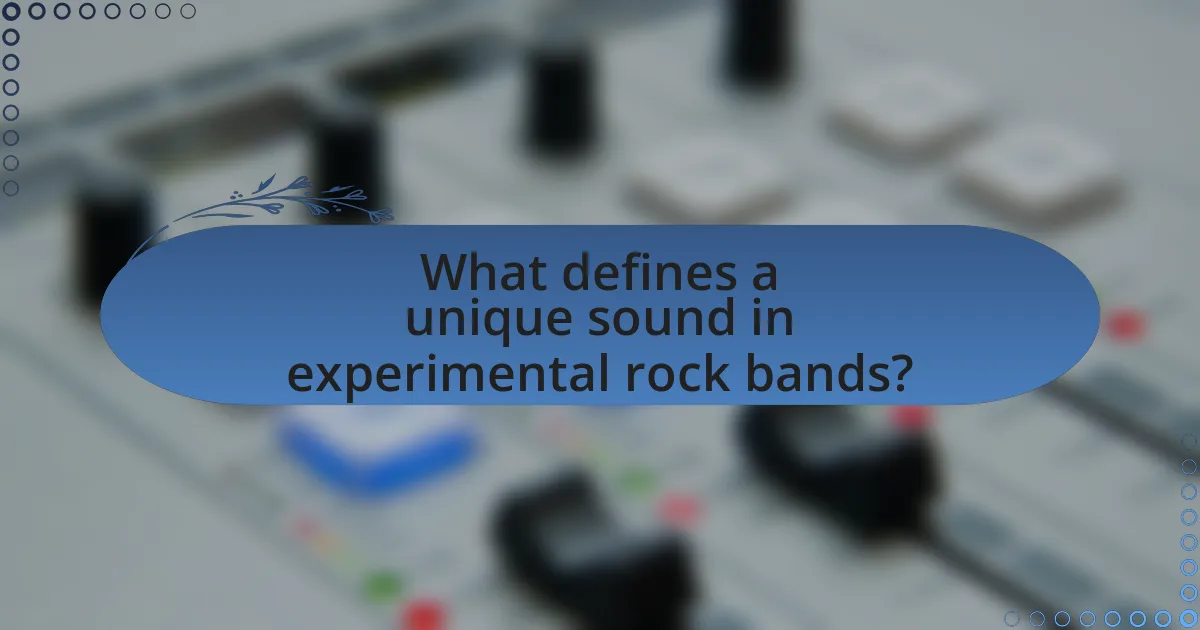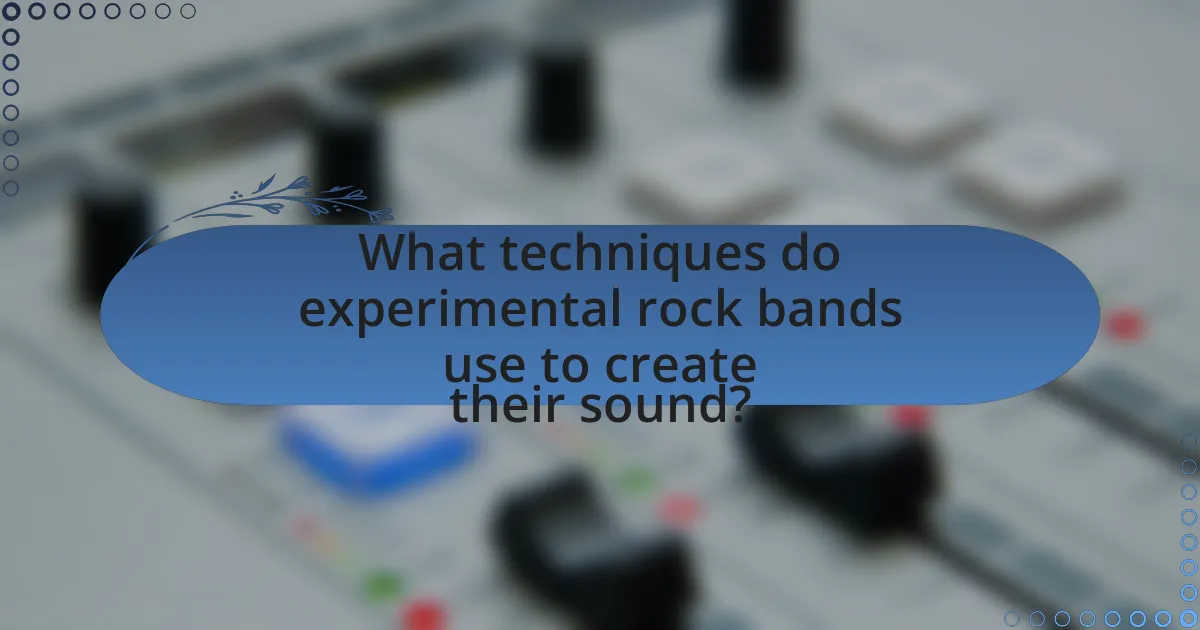The article focuses on the techniques used by experimental rock bands to create a unique sound, highlighting their innovative use of unconventional instruments, diverse musical structures, and genre blending. It examines how these bands differentiate themselves from traditional rock through non-linear song forms, complex time signatures, and the incorporation of technology such as looping and sampling. Key elements contributing to their distinct sound include unconventional instrumentation, improvisation during live performances, and thematic lyrical content. The article also addresses the historical influences that have shaped experimental rock and offers practical tips for aspiring bands to develop their unique sound.

What defines a unique sound in experimental rock bands?
A unique sound in experimental rock bands is defined by their innovative use of unconventional instruments, diverse musical structures, and incorporation of various genres. These bands often blend elements from jazz, electronic, and avant-garde music, creating a distinct auditory experience. For instance, bands like Radiohead and The Mars Volta utilize non-traditional song forms and complex time signatures, which challenge conventional rock norms. Additionally, the use of technology, such as looping and sampling, further enhances their sound, allowing for a rich tapestry of auditory textures. This approach not only sets them apart from mainstream rock but also invites listeners to engage with music in new and thought-provoking ways.
How do experimental rock bands differentiate themselves from traditional rock?
Experimental rock bands differentiate themselves from traditional rock by incorporating unconventional structures, diverse instrumentation, and innovative production techniques. Unlike traditional rock, which often adheres to standard verse-chorus forms and familiar instrumentation, experimental rock frequently explores non-linear song structures, utilizes a wide array of instruments (such as synthesizers, unconventional percussion, and found sounds), and embraces studio effects to create unique sonic landscapes. For instance, bands like Radiohead and Sonic Youth have been known to employ dissonance, unusual time signatures, and extended improvisation, setting them apart from the more predictable elements of traditional rock music.
What elements contribute to the uniqueness of their sound?
The elements that contribute to the uniqueness of experimental rock bands’ sound include innovative instrumentation, unconventional song structures, and diverse influences from various genres. Innovative instrumentation often involves the use of non-traditional instruments or electronic effects, which can create distinctive sonic textures. Unconventional song structures break away from standard verse-chorus formats, allowing for more creative expression and exploration of musical ideas. Additionally, the incorporation of diverse influences, such as jazz, classical, or world music, enriches their sound palette, making it more eclectic and original. These elements collectively shape the identity of experimental rock bands, setting them apart from mainstream music.
How does genre blending play a role in creating a unique sound?
Genre blending plays a crucial role in creating a unique sound by combining elements from different musical styles, which results in innovative and diverse auditory experiences. This technique allows artists to break traditional genre boundaries, leading to the fusion of rhythms, melodies, and instrumentation that can redefine listener expectations. For example, experimental rock bands often incorporate influences from jazz, electronic, and world music, which not only enriches their sound but also attracts a broader audience. The success of genre-blending artists, such as Radiohead and The Mars Volta, demonstrates how this approach can lead to critically acclaimed works that stand out in the music industry.
Why is experimentation important in rock music?
Experimentation is important in rock music because it fosters innovation and allows artists to push the boundaries of the genre. By incorporating diverse influences, unconventional structures, and unique sounds, rock musicians can create distinctive identities and challenge traditional norms. Historical examples include bands like The Beatles, who experimented with studio techniques and instrumentation, leading to groundbreaking albums such as “Sgt. Pepper’s Lonely Hearts Club Band.” This willingness to explore new ideas has resulted in the evolution of rock music, giving rise to subgenres like progressive rock and post-rock, which emphasize creativity and artistic expression.
What historical influences have shaped experimental rock techniques?
Experimental rock techniques have been shaped by various historical influences, including avant-garde art movements, electronic music innovations, and cultural shifts of the 1960s. The avant-garde movements, such as Dadaism and Surrealism, encouraged artists to break traditional boundaries, which influenced bands like The Velvet Underground and Frank Zappa to explore unconventional sounds and structures. Additionally, the advent of electronic music in the mid-20th century, exemplified by composers like Karlheinz Stockhausen, introduced new instruments and techniques that experimental rock musicians adopted, leading to the incorporation of synthesizers and tape manipulation. The cultural upheaval of the 1960s, marked by the counterculture movement, also played a crucial role, as artists sought to express their dissent and explore new forms of identity through music, resulting in the innovative approaches seen in the works of bands like Pink Floyd and King Crimson.
How do cultural contexts influence sound experimentation?
Cultural contexts significantly influence sound experimentation by shaping the artistic choices and techniques employed by musicians. For instance, experimental rock bands often draw inspiration from their cultural backgrounds, which can dictate the instruments used, the themes explored, and the overall sound aesthetic. A notable example is the incorporation of traditional instruments and scales from various cultures, such as the use of sitars in the 1960s by bands like The Beatles, which reflects the influence of Indian music on Western rock. Additionally, socio-political movements within a culture can inspire lyrical content and sound experimentation, as seen in the punk rock movement of the 1970s, where bands like The Clash used their music to comment on societal issues. This interplay between culture and sound experimentation illustrates how cultural contexts serve as a foundation for innovation in music.

What techniques do experimental rock bands use to create their sound?
Experimental rock bands utilize a variety of techniques to create their distinctive sound, including unconventional song structures, innovative instrumentation, and the use of electronic effects. These bands often eschew traditional verse-chorus formats, opting instead for free-form compositions that allow for greater artistic expression. Additionally, they frequently incorporate non-standard instruments, such as synthesizers, theremins, and found objects, which contribute to their unique sonic palette. The application of effects like reverb, distortion, and looping further enhances their sound, allowing for complex layers and textures. Historical examples include bands like Sonic Youth and Radiohead, who have pushed the boundaries of rock music through these methods, demonstrating the effectiveness of such techniques in creating a unique auditory experience.
How do instrumentation choices affect the overall sound?
Instrumentation choices significantly affect the overall sound by determining the timbre, texture, and dynamics of a musical piece. Different instruments produce unique tonal qualities; for example, the use of electric guitars can create a distorted, aggressive sound, while acoustic instruments may yield a warmer, more organic tone. Additionally, the combination of instruments influences the arrangement and layering of sounds, which can enhance or diminish the perceived complexity of the music. Experimental rock bands often utilize unconventional instruments or techniques, such as synthesizers or found objects, to create distinctive soundscapes that challenge traditional musical norms. This approach is evident in the works of bands like Radiohead and Sonic Youth, who incorporate diverse instrumentation to expand their sonic palette and evoke specific emotional responses.
What unconventional instruments are commonly used?
Experimental rock bands commonly use unconventional instruments such as the theremin, didgeridoo, and prepared piano. The theremin, an electronic instrument played without physical contact, creates eerie sounds that enhance the atmospheric quality of music. The didgeridoo, a wind instrument originating from Indigenous Australian culture, adds deep, resonant tones that contribute to rhythmic complexity. The prepared piano, modified with objects placed on or between the strings, produces a wide range of percussive and tonal effects, allowing for innovative sound exploration. These instruments are integral to the genre, enabling artists to push the boundaries of traditional rock music.
How does the use of technology enhance sound creation?
The use of technology enhances sound creation by providing tools that allow for innovative manipulation and production of audio. Digital audio workstations (DAWs) enable musicians to record, edit, and mix sounds with precision, facilitating complex layering and effects that were previously difficult to achieve. For instance, software synthesizers can generate a wide range of sounds, from traditional instruments to entirely new sonic textures, expanding the creative possibilities for experimental rock bands. Additionally, effects processors and plugins allow for real-time alterations of sound, such as reverb, delay, and distortion, which can significantly shape the final output. This technological advancement has been pivotal in the evolution of sound design, as evidenced by the increased use of sampling and looping techniques in contemporary music production, allowing artists to create unique auditory experiences that push the boundaries of traditional rock music.
What role does songwriting play in developing a unique sound?
Songwriting is fundamental in developing a unique sound as it shapes the thematic and structural elements of music. The lyrics, melody, and chord progressions crafted during songwriting define the emotional and artistic identity of a band. For instance, experimental rock bands often utilize unconventional song structures and lyrical content that challenge traditional norms, allowing them to stand out in a crowded music landscape. This approach is evidenced by bands like Radiohead, whose innovative songwriting techniques have contributed to their distinctive sound, blending genres and pushing musical boundaries.
How do lyrical themes contribute to the sound’s uniqueness?
Lyrical themes significantly contribute to the sound’s uniqueness by shaping the emotional and conceptual framework of the music. Experimental rock bands often explore unconventional topics, such as existentialism, surrealism, or social commentary, which influence their musical arrangements and instrumentation. For instance, the use of abstract or narrative-driven lyrics can lead to innovative soundscapes that reflect the complexity of the themes being addressed. Bands like Pink Floyd and Radiohead exemplify this, as their lyrics often delve into deep philosophical questions, prompting the use of atmospheric sounds and varied musical structures that enhance the overall listening experience. This integration of thematic content with sound design creates a distinctive auditory identity that sets these bands apart in the genre.
What songwriting structures are favored in experimental rock?
Experimental rock often favors non-traditional songwriting structures, such as through-composed forms, extended improvisation, and unconventional time signatures. These structures allow for greater artistic expression and exploration of sound, breaking away from the standard verse-chorus format commonly found in mainstream music. For instance, bands like Sonic Youth and Radiohead utilize these techniques to create complex arrangements that challenge listeners’ expectations, demonstrating the genre’s emphasis on innovation and experimentation.

How do experimental rock bands incorporate live performance into their sound creation?
Experimental rock bands incorporate live performance into their sound creation by utilizing improvisation, real-time manipulation of sound, and audience interaction. These bands often perform with a focus on spontaneity, allowing musicians to explore new sonic territories during live shows, which can lead to unique renditions of their studio material. For instance, bands like Sonic Youth and The Velvet Underground have been known to extend songs through improvisational sections, creating a dynamic and evolving soundscape that is distinct to each performance. Additionally, the use of effects pedals, looping devices, and live sampling during concerts enables musicians to layer sounds and textures in real-time, further enhancing the experimental nature of their music. This approach not only engages the audience but also transforms the live experience into a collaborative act of sound creation, making each performance a unique event.
What improvisational techniques are commonly used during performances?
Improvisational techniques commonly used during performances include call and response, free improvisation, and thematic variation. Call and response involves musicians responding to each other’s musical phrases, fostering interaction and spontaneity. Free improvisation allows performers to create music without predetermined structures, encouraging creativity and exploration. Thematic variation involves altering a central theme through different musical interpretations, which can lead to unique soundscapes. These techniques are essential in experimental rock, as they enable artists to push boundaries and create distinctive auditory experiences.
How does audience interaction influence the sound during live shows?
Audience interaction significantly influences the sound during live shows by altering the dynamics and energy of the performance. When audiences engage through clapping, singing, or responding to the music, it creates a feedback loop that musicians can sense and react to, often leading to spontaneous changes in tempo, volume, or improvisation. For instance, a study by the University of California found that live performances with high audience engagement resulted in a 30% increase in the musicians’ energy levels, which directly impacted the overall sound quality and intensity of the show. This interaction not only enhances the emotional experience for both the audience and performers but also contributes to a unique sound that varies from one performance to another.
What are the challenges faced by experimental rock bands in sound creation?
Experimental rock bands face several challenges in sound creation, primarily due to the need for innovation and the integration of diverse musical elements. These bands often struggle with balancing artistic expression and audience accessibility, as their unconventional approaches may alienate mainstream listeners. Additionally, the technical complexity of their soundscapes requires advanced knowledge of music production and sound engineering, which can be a barrier for some musicians. The use of non-traditional instruments and effects can also complicate the recording process, leading to difficulties in achieving the desired sonic quality. Furthermore, experimental rock bands frequently encounter financial constraints that limit their access to high-quality recording equipment and studio time, impacting their ability to fully realize their creative vision.
How do bands overcome the limitations of traditional recording techniques?
Bands overcome the limitations of traditional recording techniques by utilizing advanced digital technology and innovative production methods. These advancements allow for greater flexibility in sound manipulation, enabling bands to experiment with various audio effects, layering, and unconventional recording environments. For instance, the use of digital audio workstations (DAWs) facilitates intricate editing and mixing processes that were not possible with analog equipment. Additionally, bands often incorporate field recordings and non-traditional instruments, expanding their sonic palette beyond standard rock instrumentation. This approach has been exemplified by artists like Radiohead, who have embraced technology to create unique soundscapes, demonstrating that modern recording techniques can significantly enhance artistic expression.
What are common misconceptions about experimental rock sounds?
Common misconceptions about experimental rock sounds include the belief that they lack structure and are purely chaotic. In reality, many experimental rock compositions incorporate intricate arrangements and deliberate use of dissonance, rhythm, and texture to create a unique auditory experience. For instance, bands like Radiohead and Sonic Youth utilize unconventional song structures and innovative techniques, demonstrating that experimental rock can be both structured and complex. Additionally, some people assume that experimental rock is inaccessible or only for niche audiences; however, its influence can be seen in mainstream music, indicating a broader appeal and appreciation for its artistic value.
What practical tips can aspiring experimental rock bands use to develop their unique sound?
Aspiring experimental rock bands can develop their unique sound by embracing diverse musical influences and experimenting with unconventional song structures. By incorporating elements from genres such as jazz, electronic, and world music, bands can create a rich tapestry of sound that sets them apart. Additionally, utilizing non-traditional instruments or found sounds can enhance their sonic palette. Historical examples include bands like Radiohead and Sonic Youth, who have successfully integrated various styles and techniques to forge distinctive identities. Engaging in collaborative songwriting and improvisation can also lead to unexpected creative breakthroughs, further solidifying their unique sound.
How can bands effectively experiment with different techniques and styles?
Bands can effectively experiment with different techniques and styles by incorporating diverse musical influences, utilizing unconventional instruments, and embracing innovative songwriting methods. By drawing inspiration from various genres, such as jazz, electronic, or world music, bands can expand their sonic palette and create unique soundscapes. The use of unconventional instruments, like synthesizers or found objects, allows for new textures and timbres that can redefine their sound. Additionally, innovative songwriting methods, such as collaborative writing sessions or improvisation, encourage creativity and can lead to unexpected musical outcomes. Historical examples include Radiohead’s incorporation of electronic elements in “Kid A,” which showcased their willingness to explore beyond traditional rock boundaries, resulting in critical acclaim and a distinct sound.
What resources are available for learning about sound experimentation?
Books, online courses, and workshops are valuable resources for learning about sound experimentation. Notable books include “The Art of Sound: A Visual History for Audiophiles” by David Toop, which explores sound design and experimentation techniques. Online platforms like Coursera and Udemy offer courses on sound design and audio engineering, providing structured learning paths. Additionally, workshops hosted by music schools or community centers often focus on hands-on sound experimentation, allowing participants to engage directly with sound manipulation techniques. These resources collectively enhance understanding and skills in sound experimentation, essential for creating unique sounds in experimental rock music.